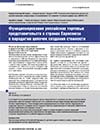The role of renewable energy sources and secondary renewable energy sources in the energy management of the European union countries
DOI: 10.33917/mic-5.118.2024.65-77
This article examines the role of renewable energy sources (RES) and secondary renewable energy sources (VVE) in the energy management of the European Union countries in modern socio-economic conditions. The decrease in electricity consumption in the EU over the past two years amounted to 6%, reflecting the serious impact of the energy crisis on European consumers and industry. This decrease of 60% is due to a slowdown in the growth rate of EU industrial production and the transfer of energy-intensive technological processes from the EU to regions with cheaper energy. It is concluded that Europe’s transition to renewable energy has reached a colossal pace, which will lead to a further reduction in fossil fuel electricity production, with renewable energy sources (wind and solar) becoming the backbone of the future EU electricity supply system by the end of 2024.
References:
1. Zhiznin S. Vasilev S. Options for using secondary renewable energy sources. Nezavisimaya Gazeta, 2020. URL: https://nvo.ng.ru/ng_energiya/2020-09-07/14_7957_variants.html
2. Redl C., Hein F., Buck M., Graichen P., Jones D. The European Power Sector in 2020: Up-to-Date Analysis on the Electricity Transition. Agora Energiewende and Ember. 2021. p. 18.
3. The share of solar and wind generation in the world will reach from 54 to 72% by 2050. URL: https://yearbook.enerdata.ru/renewables/wind-solar-share-electricity-production.html
4. National Hydrogen Strategy of Germany. URL: https://www.bmbf.de/files/bmwi_Nationale%20Wasserstoffstrategie_Eng_s0
5. Verbruggen A. In the hurdle race to the energy transition: transformations, reforms and innovations / A. Verbruggen / ed. A. Brunnengräber, Di Nucci, M. Rosaria. Wiesbaden: Springer Fachmedien Wiesbaden, 2014. p. 120.
6. Gesetz für den Ausbau erneuerbarer Energien. URL: http://www.gesetze-im-internet.de/eeg_2014/
7. Baek Ja.H., Park S.Ho., Choi S., Kim H. Renewable forecasting method for local renewable management system. Transactions of the Korean Institute of Electrical Engineers. 2022;71(8):1062–1069.
8. Beksultanova A., Aygumov T., Valeev S. Achieving renewable energy goals through the utilization of renewable resources. International Conference on Actual Problems of the Energy Complex and Environmental Protection (APEC-VI-2023). Les Ulis, 2023, p. 01008.
9. Chien F., Chayka Ka.Y., Sadiq M., Diep G.L., Tran T.K., Pham T.Ha.An. What is the role of renewable energy consumption, renewable electricity, energy use and import play in environmental quality? Energy Reports. 2023;10:3826–3834.
10. Çinar M. The investigation of the causal relationship between renewable and non-renewable energy resources and economic growth. Cankiri Karatekin Universitesi Iktisadi ve Idari Bilimler Fakultesi Dergisi, 2023.
11. Mohammadi H., Saghaian S., Zandi Dareh Gharibi B. Renewable and non-renewable energy consumption and its impact on economic growth. Sustainability. 2023;15(4):3822.
12. Soares P.H., Kang M., Choo Ph. Art and design entanglements for renewable energy education: renewable energy art and design approach. Interdisciplinary Journal of Environmental and Science Education. 2024;20(1):2401.







